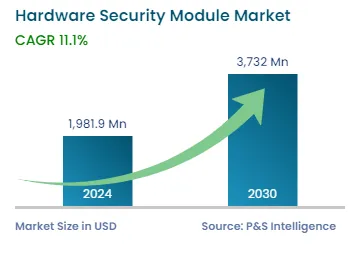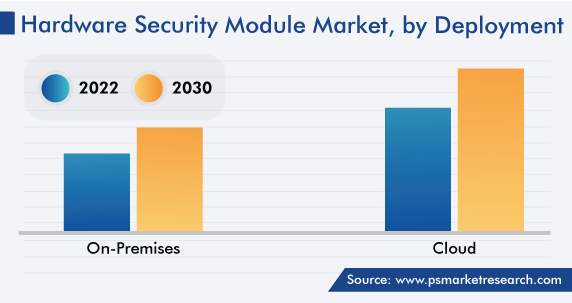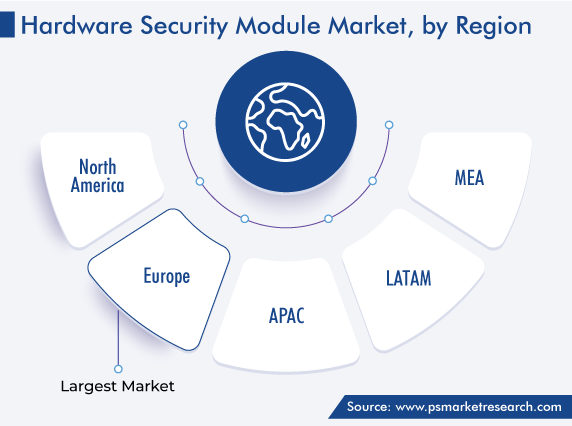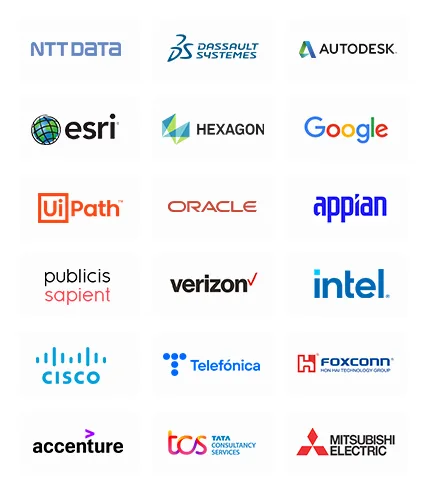Market Statistics
| Study Period | 2019 - 2030 |
| 2024 Market Size | USD 1,981.9 Million |
| 2030 Forecast | USD 3,732 Million |
| Growth Rate(CAGR) | 11.1% |
| Largest Region | Europe |
| Fastest Growing Region | Asia-Pacific |
| Nature of the Market | Fragmented |
Report Code: 10926
Get a Comprehensive Overview of the Hardware Security Module Market Report Prepared by P&S Intelligence, Segmented by Type (LAN Based/ Network Attached, PCI-Based/ Embedded Plugins, USB-Based/ Portable, Smart Cards), Application (Payment Processing, Code & Document Signing, Authentication, Application-Level Encryption, Database Encryption, PKI & Credential Management, SSL & TSL), Deployment (On-Premise, Cloud), Industry Vertical (Consumer Goods & Retail, BFSI, Aerospace & Defense, Public Sector/ Government, Energy & Power, Industrial Manufacturing, Medical & Life Sciences, Transportation, IT & Telecommunications), and Geographic Regions. This Report Provides Insights From 2019 to 2030.
| Study Period | 2019 - 2030 |
| 2024 Market Size | USD 1,981.9 Million |
| 2030 Forecast | USD 3,732 Million |
| Growth Rate(CAGR) | 11.1% |
| Largest Region | Europe |
| Fastest Growing Region | Asia-Pacific |
| Nature of the Market | Fragmented |

Explore the market potential with our data-driven report
The hardware security modules market size stood at USD 1,981.9 million in 2024, and it is expected to grow at a compound annual growth rate of 11.1% during 2024–2030, to reach USD 3,732 million by 2030.
A hardware security module is a specialized physical device that performs all major cryptographic operations, including decryption, encryption, authentication, and key management. These security devices protect and hide cryptographic materials and store crypto keys in one place, as opposed to several different locations. They have restricted network access, protected via a firewall. HSMs are also tamper-evident and tamper-resistant devices.
Enterprises invest in hardware security modules for the protection of transactions, identities, and applications, such as the security of cryptographic keys and digital signing services for different uses.
An increase in the number of cyberattacks and data breaches all over the world, rising penetration of 5G, increasing adoption of cloud-based services, need for high levels of trust and authentication in security modules, and growing e-commerce industry, with the increasing usage of mobile banking applications, will all drive the growth of the market during the forecast period.
The demand for hardware security modules was majorly impacted by COVID-19. The shutdown of factories across the globe resulted in a reduction in the demand for analog semiconductors. With the imposed lockdowns and disturbed supply chains, the incorporation of security modules for encrypting data related to factory machines reduced, which impacted the market negatively. As the lockdowns have now been removed and the situation has started getting back to normal, the market would grow at an exponential rate in the future.
The internet of things (IoT) technology has proliferated in this modern, digital world. Smart devices and sensors are collecting huge volumes of data and transforming it into business insights more rapidly, at a lower cost, and with higher accuracy. IoT has been transforming many consumer, industrial, government, and defense applications, with use cases spanning the supply chain, operations, customer relationship management, quality control, inventory management, and HR business functions.
The growth of the hardware security modules market is essentially driven by an increase in the demand for information and data security, which results in the adoption of modern technologies, such as IoT and . With IoT, to maintain the level of authenticity, enterprises’ privacy and data communication become important areas to focus on. By 2030, the number of consumer IoT devices would be more than three times the 2019 levels.
Therefore, to meet the growing demand for device security, in 2019, ATOS SE announced the launch of an HSM designed primarily to secure the IoT ecosystem by using cryptographic features.
The rise in the need for personalization and self-service on products and services is the major factor for the growth in the usage of mobile banking applications. Moreover, the technological advancements in mobile banking, such as the smart bots used for personalized real-time customer service, and the increase in the usage of smartphones fuel the growth in the number of individuals accessing banking services through mobile applications.
With the rise in the usage of mobile banking apps comes a higher risk of cyber fraud, thus propelling the need for hardware security modules. According to research, 70% of the people use mobile apps as their primary means to access their banking accounts. The development of mobile banking apps entails adherence to strict security regulations and processes. HSM protects users from any kind of cyber fraud or leakage of confidential data while accessing their accounts. Thus, with the rise in the number of mobile app users, the adoption of HSMs will continue to rise.
The cloud deployment category is predicted to expand at the higher rate, of around 15%, over the projection timeframe. With cloud-based HSMs, industries can generate encryption keys on the cloud with ease, without the need for hosting and maintaining on-premises servers. The other benefits organization are offered by cloud services are flexibility, scalability, and the convenience of updating systems so that companies can invest their time in their core business strategies.
In January 2021, Futurex LP announced that a web API must be used for payment HSMs, to deploy payment applications with the company’s key management technology and enterprise encryption.

The USB-based/portable category is predicted to expand at the highest rate, of around 14.8%, over the projection timeframe. These devices are portable and small, therefore can be deployed for various functions, such as coding and signing, digital signatures, and secure key storage. Portable HSMs are majorly used for offline operations, with a physical safe used for storing the module.
These variants are preferred by all industries as they offer superior security, cost-efficiency, and ease of deployment. HSMs with USBs are, therefore, widely used by governments and financial institutions to secure data, applications, and identities, to reduce the chances of risk and ensure regulatory compliance. Moreover, USB connectivity makes such modules suitable for use with desktops, laptops, and workstations. With the use of an integrated reader, these modules become ideal for situations with limited space or where they must be used frequently.
These modules also come with integrated hardware-based security solutions ensuring increased protection for confidential data. They can be inserted easily into systems and servers by just plugging them in, which results in easily securing cloud data, cryptocurrency exchanges, and IoT gateways. Moreover, the data inside less-secure storage is verified by these devices, which also encrypt it for storage.
The banking, financial services, and insurance (BFSI) category is predicted to expand at the highest rate, of around over 15.1%, over the projection timeframe, primarily due to the increasing demand for digital banking, 3D secure payments, and e-wallet payment solutions. For a long time, hackers have strongly focused on the BFSI sector, using modern techniques to steal bank account and credit/debit details, tax records, user credentials, and insurance data, which drives the usage of hardware security modules here.
For example, in May 2022, LevelField tied up with Metaco as a technology service provider on IBM Cloud, for its digital asset operations. Supported by IBM Cloud Hyper Protect Services, the orchestration and digital asset custody platform of Metaco has been created to store encrypted keys in an external database, which is protected by IBM's level 4-rated hardware security modules.
Consumer goods and retail is projected to witness the second-highest growth rate in the market. Poor security can lead to problems such as hackers taking control of the manufacturing software or stealing customers’ information. The loss of such data can lead to high financial losses and the destruction of the company reputation. Thus, the usage of HSMs is growing in the retail industry to provide high levels of protection, to prevent the theft of critical product information. In this vertical, hardware security modules provide solutions such as message authentication, PIN card processing, general-purpose cryptographic processing, and comprehensive key management.
Drive strategic growth with comprehensive market analysis
North America has a significant market share, due to the increasing adoption of these devices in various industries, such as retail, telecom, and government, in the U.S. and Canada. The last few years have witnessed a steady rise in the adoption of cloud technologies by businesses. Moreover, the rapid digitalization of business operations and the high internet penetration have consequently increased the risk of data breaches and other cybercrimes, forcing enterprises to adopt robust cybersecurity solutions.
These solutions help enterprises with virus containment and network intrusion detection, which helps them secure digital assets and minimize the risk of any loss. In November 2021, the American government declared an investment of USD 2 billion in cybersecurity for the energy, transportation, manufacturing, water utilities, IT, and healthcare sectors. In addition, the growing concerns about a Russian cyberattack on the U.S., in the wake of the Russia and Ukraine War, are expected to increase the U.S.’s focus on making investments in cybersecurity, including HSMs.
Moreover, the Asia-Pacific market is expected to register a high revenue growth rate during the forecast period due to the technological developments, digitalization of firms, and increasing incidence of cyberattacks, especially in China, Japan, and India. Asia was the most-targeted region by cybercriminals in 2021.
Over 59% of the organizations in APAC have experienced a cyber incident, of which 32% have suffered multiple incidents, including malware, ransomware, spyware, and viruses. Further, phishing and password-related attacks are the top cybersecurity issues, accounting for more than half the incidents reported. The rising concerns about cyberattacks create a high demand for network security as well as hardware security modules across the region, which has prompted semiconductor and computer hardware companies to invest more here.
For instance, in February 2022, IBM announced plans to make substantial investments in a cybersecurity training center in India to manage cybersecurity issues across Asia.

This report offers deep insights into the hardware security module industry, with size estimation for 2019 to 2030, the major drivers, restraints, trends and opportunities, and competitor analysis.
Based on Type
Based on Application
Based on Deployment
Based on Industry Vertical
Geographical Analysis
The market for hardware security modules generated USD 1,981.9 million in 2024.
The hardware security modules industry is led by North America.
Payment processing applications dominate the market for hardware security modules.
The hardware security modules industry is driven by the rising usage of online banking and the overall digitization of verticals.
The fastest growth in the market for hardware security modules will be in the BFSI industry.
Want a report tailored exactly to your business need?
Request CustomizationLeading companies across industries trust us to deliver data-driven insights and innovative solutions for their most critical decisions. From data-driven strategies to actionable insights, we empower the decision-makers who shape industries and define the future. From Fortune 500 companies to innovative startups, we are proud to partner with organisations that drive progress in their industries.


Working with P&S Intelligence and their team was an absolute pleasure – their awareness of timelines and commitment to value greatly contributed to our project's success. Eagerly anticipating future collaborations.
McKinsey & Company
IndiaOur insights into the minutest levels of the markets, including the latest trends and competitive landscape, give you all the answers you need to take your business to new heights
We take a cautious approach to protecting your personal and confidential information. Trust is the strongest bond that connects us and our clients, and trust we build by complying with all international and domestic data protection and privacy laws
Customize the Report to Align with Your Business Objectives
Request the Free Sample Pages